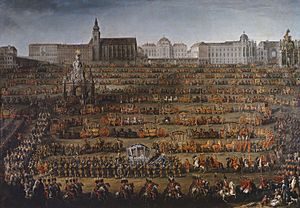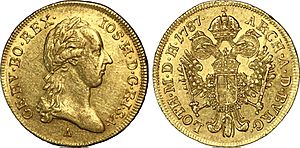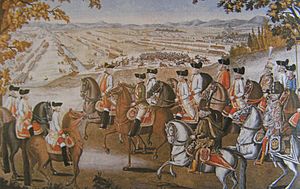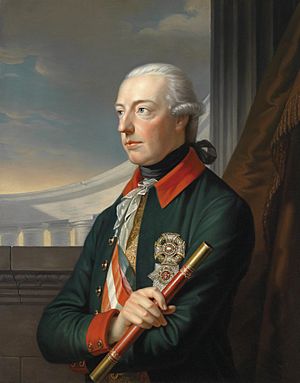Joseph II, Holy Roman Emperor facts for kids
Quick facts for kids Joseph II |
|
|---|---|
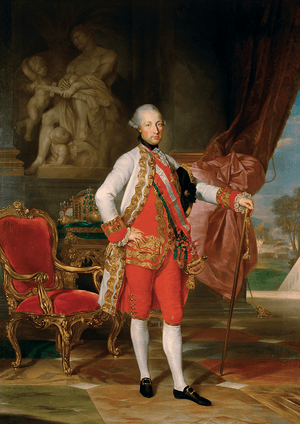
Portrait by Anton von Maron, c. 1775
|
|
| Holy Roman Emperor (more...) | |
| Reign | 18 August 1765 – 20 February 1790 |
| Proclamation | 3 April 1764, Frankfurt |
| Predecessor | Francis I |
| Successor | Leopold II |
| Born | 13 March 1741 Schönbrunn Palace, Vienna, Austria |
| Died | 20 February 1790 (aged 48) Vienna, Austria |
| Burial | Imperial Crypt |
| Spouse | |
| Issue |
|
| House | Habsburg-Lorraine |
| Father | Francis I, Holy Roman Emperor |
| Mother | Maria Theresa |
| Religion | Catholicism |
| Signature | |
Joseph II (born 13 March 1741 – died 20 February 1790) was a powerful ruler in Europe. He was the Holy Roman Emperor from 1765 and the main ruler of the Habsburg lands from 1780 until his death. He was the eldest son of Empress Maria Theresa and Emperor Francis I. His sister was Marie Antoinette, who became the Queen of France. Joseph II was the first ruler from the Habsburg-Lorraine family.
Joseph believed in "enlightened absolutism." This meant he wanted to rule with total power but also use new ideas to make his country better. He tried to make many changes, like making the government more modern and giving people more freedom. However, many people didn't like his changes, so they were hard to put into practice. He is known as one of the "Enlightenment monarchs," like Catherine the Great of Russia and Frederick the Great of Prussia. His ideas and policies are called Josephinism.
Joseph II also loved the arts. He supported famous composers like Wolfgang Amadeus Mozart and Antonio Salieri. He died without any children who lived past childhood. His younger brother, Leopold II, became the next ruler.
Contents
Early Life and Education
Joseph was born in 1741, during a time of war called the War of the Austrian Succession. His education came from the writings of important thinkers like Voltaire and Jean-Jacques Rousseau. He also learned from the example of other rulers, especially King Frederick II.
Government officials taught him how to manage the many different states that made up the Austrian lands and the Holy Roman Empire. This practical training helped him understand how to run a large country.
Marriages and Family Life
Joseph married Princess Isabella of Parma in October 1760. This marriage was arranged to strengthen an alliance between France and Austria. Joseph truly loved Isabella. He found her smart and charming.
Isabella also became very close friends with Joseph's sister, Maria Christina, Duchess of Teschen. Joseph and Isabella had one daughter, Maria Theresa. Isabella was often worried about pregnancy and dying young, especially because her own mother had died early.
After their daughter was born, Isabella had two miscarriages. This was very hard on her. Then she became pregnant again. In November 1763, while six months pregnant, Isabella got smallpox. She gave birth early to a second child, Archduchess Maria Christina, who died soon after.
Isabella died the next week from smallpox. Joseph was heartbroken by the loss of his wife and newborn child. He did not want to marry again. He remained a loving father to his daughter, Maria Theresa.
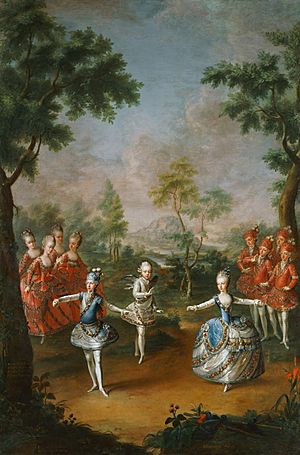
For political reasons, Joseph was pressured to marry again. In 1765, he married his second cousin, Maria Josepha of Bavaria. This marriage was very unhappy and only lasted two years.
Maria Josepha loved Joseph, but she felt shy and less important than him. Joseph felt no love or attraction for her. He avoided her, seeing her only at meals. Maria Josepha was very sad in this cold marriage.
Four months after their second wedding anniversary, Maria Josepha became ill and died from smallpox. Joseph did not visit her or go to her funeral. Later, he regretted not being kinder to her. This marriage did help Joseph claim some land in Bavaria, which later led to a war.
Joseph never married again. In 1770, his only surviving child, seven-year-old Maria Theresa, died from an illness. This loss was very painful for him. Since he had no children, his younger brother, Leopold II, became the next emperor.
Co-Ruler with His Mother
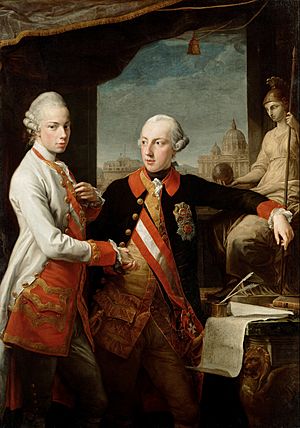
After his father died in 1765, Joseph became Holy Roman Emperor. His mother, Maria Theresa, made him a co-ruler of the Austrian lands. However, she kept most of the real power for herself. Joseph often disagreed with his mother. He wanted to make many changes, but she had the final say.
Joseph wanted more religious freedom and to reduce the power of the church. He also wanted to help peasants and remove trade restrictions. He was like other "enlightened" rulers of his time. He tried to free serfs (peasants tied to the land), but this change did not last after his death.
Joseph believed the state should have strong power, guided by reason. He thought he knew what was best for his people. He also believed his family had a right to expand their lands. He found it hard to understand why people would oppose his plans.
Joseph traveled a lot during these years. He met Frederick the Great twice. These meetings led to the first division of Poland, which Joseph fully supported. He also visited his sister, Marie Antoinette, in France. He saw problems in France and predicted the monarchy would fall.
In 1778, Joseph commanded troops against Frederick in the War of the Bavarian Succession. His mother, Maria Theresa, wanted peace, so there was little fighting. This war made other German princes wary of Joseph. They saw Frederick as their protector.
Sole Reign and Reforms
When Maria Theresa died in November 1780, Joseph was finally free to rule on his own. He immediately began to make many changes. He wanted to create an "enlightened despotism" – a government where he had total power but used it for the good of everyone.
He worked to spread education and reduce the power of the church. He closed many monasteries and made the church more controlled by the state. In 1781, he issued the Patent of Tolerance, which gave some religious freedom to non-Catholics. He also made German the official language to promote unity.
Joseph worked quickly, sometimes without enough preparation. He continued his mother's work to free peasants and abolished serfdom in 1781. In 1789, he ordered that peasants be paid in cash instead of working for their landlords. However, these changes were not popular with nobles or peasants, as they were used to a barter system. Joseph also ended the death penalty in 1787, though it was brought back in 1795.
After the French Revolution began in 1789, Joseph tried to help his sister, Queen Marie Antoinette, and King Louis XVI of France. He planned a rescue, but it failed. Joseph died in 1790, making it harder for Austria to help the French royal family.
Government Changes
After his mother died, Joseph issued thousands of new laws to change every part of the empire. He wanted to make his people happy, but only in ways he thought best.
Joseph aimed to create a fair, centralized government for all his lands. He wanted government workers to be dedicated to the state, just like him. He hired people based on their skills, not their social class. To make things more uniform, he made German the official language everywhere. He also took away many powers from the Hungarian assembly.
Legal and Social Reforms
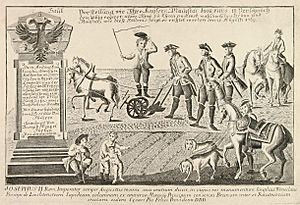
Joseph completely changed the legal system. He got rid of harsh punishments and the death penalty in most cases. He made sure everyone was treated equally by the law. He also allowed more freedom for newspapers and plays.
In 1781–82, he gave full legal freedom to serfs. He tried to make taxes fair by assessing all land in the empire. This was meant to modernize the relationship between landowners and peasants. It also aimed to reduce the tax burden on peasants and increase state money.
However, these reforms faced strong opposition from nobles, peasants, and even some officials. Most of them were cancelled shortly before or after Joseph's death. They failed because they tried to change too much, too fast. They also tried to change old customs that villagers relied on.
In cities, Joseph's new economic ideas aimed to weaken old trade guilds. His tax reforms and new factory rules helped this. He also included agriculture in his reforms.
Education and Healthcare
To make people more educated, Joseph made elementary school required for all boys and girls. He also offered higher education for talented students. He created scholarships for poor students and allowed schools for Jews and other religious groups. In 1784, he ordered that German replace Latin as the language of instruction in schools. This was a very controversial step in an empire with many languages.
Joseph also tried to improve healthcare. He built a large, central hospital in Vienna, the famous Vienna General Hospital, which opened in 1784. While this led to some problems at first, Vienna later became a leading city in medicine.
Religious Changes
Joseph's religious policies were some of the most daring in Europe. He called himself the protector of Catholicism, but he strongly reduced the power of the Pope. He wanted the Catholic Church in his empire to be controlled by the state, not by Rome.
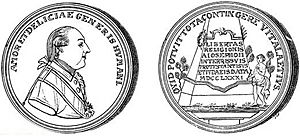
He made priests study in government-controlled schools. Bishops had to promise loyalty to the crown. He also closed many monasteries (over 700 were shut down) because he thought they were not productive. He reduced the number of monks and nuns. Church courts were ended, and marriage became a civil contract, not just a church matter.
Joseph also cut down on the number of religious holidays. He simplified how the Catholic Mass was celebrated. People who opposed these changes said they showed Protestant ideas. Traditional Catholics were very against the emperor's actions.
Joseph's Patent of Toleration in 1781 was a big change. It gave limited religious freedom to major non-Catholic Christian groups. This was followed by the Edict of Tolerance in 1782, which removed many rules against Jews.
In 1782, he banned several monastic orders that were not involved in teaching or healing. He took their wealth for a "Religious Fund." Joseph was also friendly towards Freemasonry. He thought it fit well with his Enlightenment ideas.
Joseph's views on religion were less strict than his mother's. He once joked that when it came to theology, "there is never much light." In 1789, he gave a charter of religious tolerance to the Jews of Galicia. This charter also aimed to make them more German and wear non-Jewish clothes.
Foreign Policy
Joseph wanted to expand the Habsburg Empire. He often sought to gain more land. His main goal was to get Bavaria, possibly by trading the Austrian Netherlands for it. However, Frederick II stopped him twice. Other German princes also joined Frederick's side because they worried about Joseph's plans for their lands.
In 1780, Joseph visited the Russian Empress Catherine the Great. This led to an alliance between Russia and Austria, which included plans against the Ottoman Empire. This alliance was important because it ended a previous alliance between Russia and Prussia.
The agreement with Russia led Austria into an expensive war with the Turks (1787–1791). Joseph was not eager for this war, but he saw it as necessary for his people's safety. After some early losses, the Austrians won battles in 1789, including capturing Belgrade. However, these victories did not lead to big gains for Austria. The war ended with the Treaty of Sistova in 1791, with only small gains for Austria.
Reactions to His Rule
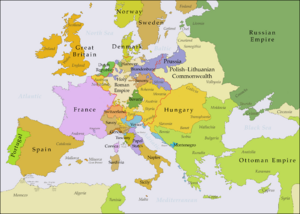
Joseph's many changes to old customs caused unrest everywhere in his empire. Nobles were against his tax policies and his ideas of equality. In the Austrian Netherlands and Hungary, people disliked how he tried to remove local governments. He wanted to control everything from Vienna.
Ordinary people were also unhappy. They did not like the emperor interfering in their daily lives. It seemed to many Austrians that Joseph was trying to change their characters, not just their laws. Just weeks before he died, a police report said that "All classes... are discontented and indignant."
In Lombardy (northern Italy), Joseph's changes led to strong resistance. He created a powerful government controlled from Vienna. This reduced Lombardy's political and economic importance. Middle-class reformers who had supported his mother's changes now opposed him.
In 1784, Joseph tried to make German the official language in Hungary. The Hungarian assembly protested strongly. Joseph had the Holy Crown of Hungary brought to Vienna. He refused to be crowned with it, which angered many Hungarians. He believed in a civil code that applied to everyone equally. The Austrian Civil Code was published in 1786.
By 1790, rebellions had broken out in the Austrian Netherlands and Hungary. His empire was in danger of falling apart. Joseph was forced to cancel almost all his reforms in Hungary on 30 January 1790.
Death
In November 1788, Joseph returned to Vienna with very poor health. He felt abandoned by his ministers and even his brother. Joseph, tired and heartbroken, realized his plans would not be carried out.
Joseph died on 20 February 1790. He is buried in the Imperial Crypt in Vienna. He asked for an epitaph that read: "Here lies a ruler who, despite his best intentions, was unsuccessful in all of his endeavors."
His brother, Leopold II, became the next emperor.
Legacy and Memory
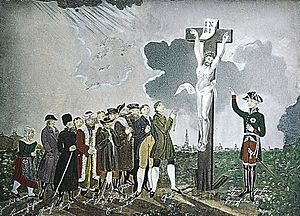
Historians often rank Joseph II as one of the three great Enlightenment monarchs. The others are Catherine the Great and Frederick the Great.
The ideas of Josephinism continued through the Austrian Enlightenment. Some writings, now known to be false, made Joseph II seem more radical than he probably was. These writings created a bigger-than-life image of him as a philosopher-king.
In 1849, the Hungarian Declaration of Independence stated that Joseph II was not a true King of Hungary because he was never crowned. Therefore, any laws from his reign were considered invalid.
Historians have had different views of Joseph. Some saw him as a hero who fought against old noble privileges. Others criticized him for being too forceful and impatient. Many agree that his reign was a key step in modernizing the Austrian Monarchy. His reforms, even the ones that failed, laid a foundation for future changes.
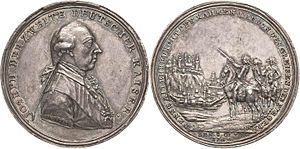
Joseph's image in popular memory has changed over time. Many monuments were built for him after his death. However, some were torn down later, like in Czechoslovakia in 1918. The Czechs liked his education and religious reforms but disliked his efforts to centralize power and make German the official language.
The Józsefváros district in Budapest was named after him in 1777.
Patron of the Arts
Like many "enlightened despots" of his time, Joseph loved and supported the arts. He was known as the "Musical King." He encouraged German-language opera. He asked Wolfgang Amadeus Mozart to write the opera Die Entführung aus dem Serail. The young Ludwig van Beethoven was asked to write a funeral song for him, but it was too difficult to perform.
Joseph is shown in the play Amadeus and the movie based on it. In the movie, he is a kind but somewhat confused king who loves music. He is easily influenced by Antonio Salieri. However, the play is fiction and not meant to be fully historically accurate.
Joseph also turned Vienna's old defensive areas into public parks. The medieval walls around Vienna had a wide, clear space around them for defense. Joseph filled in the ditch and created paths and planted trees. This green space became a public park until the 19th century.
See also
 In Spanish: José II del Sacro Imperio Romano Germánico para niños
In Spanish: José II del Sacro Imperio Romano Germánico para niños
- Edict on Idle Institutions
- Family tree of the German monarchs
- Patent of Toleration
Images for kids
-
Coronation of the Archduke Joseph as King of the Romans in the Imperial Cathedral of Saint Bartholomew in Frankfurt, 3 April 1764
 | Delilah Pierce |
 | Gordon Parks |
 | Augusta Savage |
 | Charles Ethan Porter |


